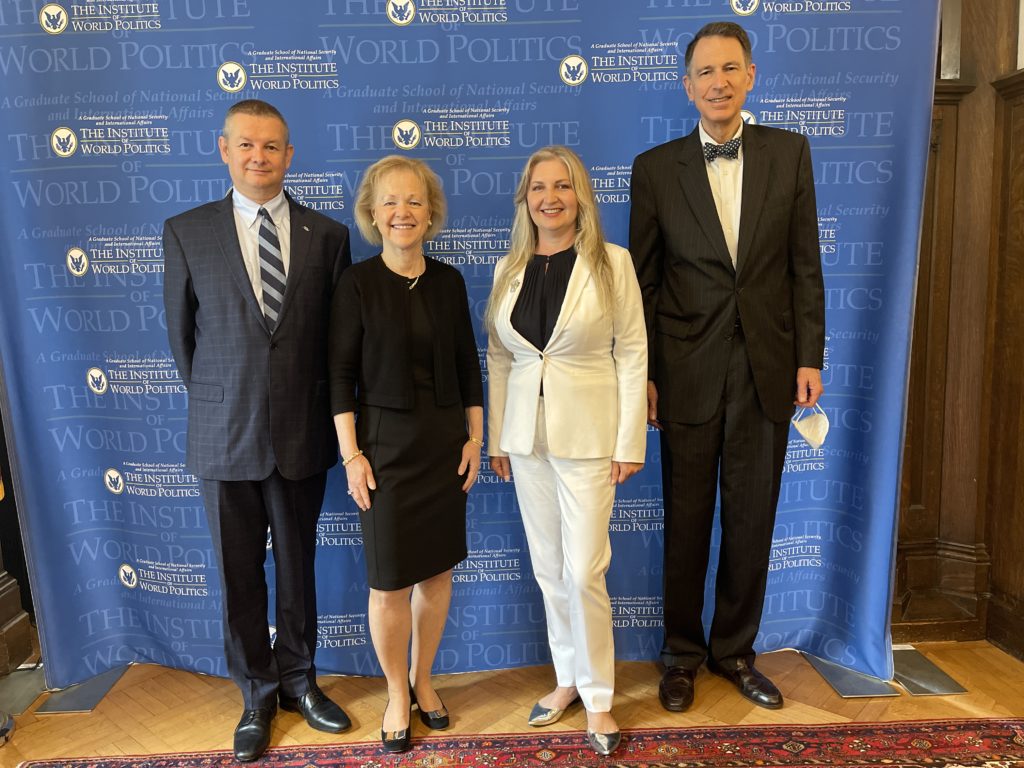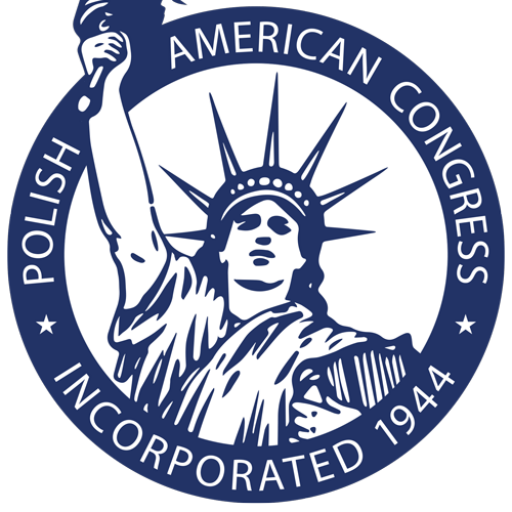By Małgorzata Margo Schulz
The Institute of World Politics is a graduate school of national security, intelligence and international affairs founded in 1990 in Washington, D.C. Its mission is to develop leaders with a sound understanding of international realities and the ethical conduct of statecraft based on knowledge and appreciation of the principles of the American political economy and the Western moral tradition.
IWP offers five MA degrees, including: Statecraft and National Security Affairs, Statecraft and World Politics; and Strategic Intelligence Studies; two online MA degrees; the nation’s first professional doctorate in Statecraft and National Security Affairs; plus 18 Graduate Certificates.
IWP is unique among graduate schools, filling several national needs with a curriculum offered by no other academic institution in America.
IWP teaches all the arts of statecraft: i.e., the various instruments of power and how they are integrated in grand strategy, including: diplomacy, military strategy, public diplomacy and strategic influence, intelligence, counterintelligence, political warfare, economic strategy, moral suasion, and the principles of leadership. Its philosophy is that if all the various non-military arts are properly used, it can minimize the necessity of having to use force to protect U.S. vital interests.
This curriculum is designed to prepare students to be effective practitioners in national security – particularly in detecting, preventing, managing, mitigating, resolving, and prevailing in international conflicts, and matching the ends and means of policy.
The curriculum emphasizes the strategic role of ideas, values, and belief systems in world politics and the role of ethics and American founding principles in U.S. foreign policy.
Of all professional schools of international affairs, IWP is unique in its commitment to character development and the cultivation of those personal and civic virtues necessary for moral leadership in the most sensitive functions of government.
The President of IWP is Aldona Wos, former Ambassador to Estonia.
Ambassador Aldona Z. Woś was born in Warsaw, Poland. Her father survived Flossenburg Concentration Camp and her mother survived Nazi Germany’s child slave labor. Her father, Paul Zenon Woś, was a member of the Polish Home Army and recipient of many distinguished awards including the “Righteous Among the Nations” medal from Yad Vashem.
In 2002 and 2004, President George W. Bush appointed Ambassador Woś to the US Holocaust Memorial Council. In 2004, she was appointed as the U.S. Ambassador to the Republic of Estonia. During her tour she focused on winning the hearts and minds of the next generation of Estonian leaders, Russian integration, HIV and AIDS prevention, and the preservation of Estonian culture. For her service, Ambassador Woś was awarded the Order of the Cross of Terra Mariana 1st Class by the President of the Republic of Estonia, the Distinguished Service Cross of the Estonian Defense Forces, and the Cross of Merit of
the Estonian National Police Board. In 2007, she received the Commander’s Cross of the Order of Merit of the Republic of Poland. In 2008, she was presented the Ellis Island Medal of Honor. She was invested in the Sovereign Order of Malta in 2010.
In 2012, Ambassador Woś served on The University of North Carolina’s Board of Governors. From 2013 to 2015 she served as North Carolina’s Secretary of the Department of Health and Human Services overseeing more than 18,000 employees across North Carolina and a nearly $2 billion budget. In 2017, President Donald Trump appointed Ambassador Woś as the Vice Chair of the President’s Commission on White House Fellowships. In 2018, she was appointed to the Duke Law Board of Visitors. In 2020, President Donald Trump nominated Ambassador Woś to be the U.S. Ambassador to Canada. Ambassador Woś also serves on the boards of The Victims of Communism Memorial Foundation, the Council of American Ambassadors, and she is currently the Interim President of The Institute of World Politics.
Ambassador Woś earned her M.D. at the Warsaw Medical Academy and completed her internship and residency in Internal Medicine including a fellowship in Pulmonary Medicine in New York City. Her career as a doctor included private practice, corporate medicine, clinical care, teaching, and consulting for both hospitals and private industry. She holds an Honorary Doctorate of Laws from the Institute of World Politics, and an Honorary Doctorate of Humanities from Greensboro College.
Professors are scholar-practitioners with both academic credentials and high-level experience in the subjects they teach. IWP has also established a vast network of former and current senior government officials who serve as guest lecturers.
Part of the Institute is the Kościuszko Chair of Polish Studies, of which Dr. Marek Jan Chodakiewicz is the current holder. Lady Blanka Rosensteil’s American Institute of Polish Culture donated $1 million to endow The Kosciuszko Chair in Polish Studies, which was inaugurated at IWP on November 7, 2008.
Dr. Marek Jan Chodakiewicz currently serves as a Professor of History at The Institute of World Politics, where he holds the Kosciuszko Chair of Polish Studies. He also leads IWP’s Center for Intermarium Studies.
He was formerly an assistant professor of history of the Kosciuszko Chair in Polish Studies at the Miller Center of Public Affairs at University of Virginia. He also served as a visiting professor of history at Loyola Marymount University in Los Angeles.
Dr. Chodakiewicz has authored numerous works in both English and Polish. While at the University of Virginia, he edited the Kosciuszko Chair’s bulletin: Nihil Novi.
Dr. Chodakiewicz writes weekly columns for popular Polish press and contributes to the SELOUS Foundation internet hub. He has also published on foreign policy in various venues, including The Journal of World Affairs, American Spectator, and National Review Online.
In addition to numerous popular and scholarly articles, Dr. Chodakiewicz authored, co-authored, edited, and co-edited over fifteen scholarly monographs and documentary collections. His latest include Intermarium: The Land Between the Black and Baltic Seas (2012), which is a depiction of the Eastern Borderlands of the West on the rim of the former Soviet Union, and On the Right and Left (2013), which is a textbook of intellectual history of modern ideologies. He translated and edited the correspondence of the Ulam family of Lwów to the mathematician Stanislaw Ulam at Harvard from 1936 until after the Second World War and co-edited a selection of Ronald Reagan’s speeches published as My Vision of America in Polish.
His interests include the post-Soviet zone, the Second World War and its aftermath, Europe in the 19th and 20th century, Western civilization and its intellectual tradition, extremist movements in history, conspiracy theory and practice, and comparative civilizations.
At IWP, Dr. Chodakiewicz teaches courses on Contemporary Politics and Diplomacy, Geography and Strategy, Mass Murder Prevention in Failed and Failing States, and Russian Politics and Foreign Policy.
The Kościuszko Chair serves as a center for Polish Studies in the broadest sense, including learning, teaching, researching, and writing about Poland’s culture, history, heritage, religion, government, economy, and successes in the arts, sciences, and letters, with special emphasis on the achievements of Polish civilization and its relation to other nations, particularly the United States.
The mission of the Chair is premised, in part, on the belief that over the last several centuries, the written record of Polish history has been shaped by political forces inimical to Polish independence and culture: including the imperial powers that partitioned Poland in the 18th century, Nazi Germany, and the Soviet Union.
The founder of Institute of World Politics is Dr. John Lenczkowski.
President Emeritus, and Chancellor of The Institute of World Politics, an independent graduate school of national security, intelligence, and international affairs in Washington, D.C. IWP is dedicated to developing leaders with a sound understanding of international realities and the ethical conduct of statecraft, based on knowledge and appreciation of American founding principles and the Western moral tradition. Offering a doctoral program, seven Master’s degrees and eighteen certificate programs, IWP is the only academic institution dedicated to teaching all the arts of statecraft, including: military strategy, the art of diplomacy; public diplomacy, opinion formation, political warfare; intelligence, counterintelligence, economic strategy, and moral leadership, and how these arts are integrated into national strategy.
From 1981 to 1983, Dr. Lenczowski served in the State Department in the Bureau of European Affairs and as Special Advisor to Under Secretary for Political Affairs Lawrence Eagleburger. From 1983 to 1987, he was Director of European and Soviet Affairs at the National Security Council. In that capacity, he was principal Soviet affairs adviser to President Reagan.
He has been associated with several academic and research institutions in the Washington area, including Georgetown University, the University of Maryland, the American Enterprise Institute, the Ethics and Public Policy Center, the Council for Inter-American Security, and the International Freedom Foundation. He has also served on the staff of Congressman James Courter.
Dr. Lenczowski attended the Thacher School, earned his B.A. at the University of California, Berkeley, and received his M.A. and Ph.D. from the Johns Hopkins University School of Advanced International Studies.
He is the author of Soviet Perceptions of U.S. Foreign Policy (1982); The Sources of Soviet Perestroika (1990), Cultural Diplomacy: A Multi-faceted Strategic Asset of Soviet Power (1991); Full-Spectrum Diplomacy and Grand Strategy (2011) and numerous other writings and addresses on U.S. foreign policy, public diplomacy, cultural diplomacy, counter-propaganda, political warfare, Soviet/Russian affairs, comparative ideologies, intelligence, strategic deception, counterintelligence, and integrated strategy.
The Institute’s student body includes traditional graduate students and a mix of mid-career professionals from government agencies, the armed forces, industry, and foreign embassies and governments whose various perspectives enrich the classroom experience.

